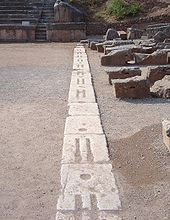
Back Pitiese Spele Afrikaans الألعاب البيثية Arabic Xuegos Píticos AST Питийски игри Bulgarian Jocs Pítics Catalan Pýthické hry Czech Pythiske lege Danish Pythische Spiele German Πύθια Greek Pitiaj ludoj Esperanto
This article needs additional citations for verification. (November 2019) |


The Pythian Games (‹See Tfd›Greek: Τα Πύθια, translit. Ta Pythia) were one of the four Panhellenic Games of Ancient Greece. They were held in honour of Apollo at his sanctuary in Delphi every four years, two years after the Olympic Games, and between each Nemean and Isthmian Games. The Pythian Games were founded sometime in the 6th century BC. In legend they were started by Apollo after he killed Python and set up the Oracle at Delphi. They continued until the 4th century AD.
The Pythian Games were ranked second in importance behind the Olympics. Unlike the Olympics, the Pythian Games also featured competitions for art and dance, which pre-dated the athletic portion of the games, and women were allowed to take part in some events. Victors received a wreath of bay laurel, sacred to Apollo, from the Vale of Tempe, in Thessaly. Smaller versions of the Pythian Games were celebrated in many other cities of the Levant and Greece.